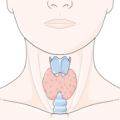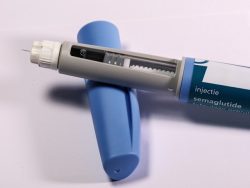In 2013, the FDA updated the warning labels on all fluoroquinolones (Cipro, Levaquin, Avelox, Floxin and their generic equivalents) to note that permanent peripheral neuropathy is a potential effect of all fluoroquinolones. The FDA safety announcement noted that, “The U.S. Food and Drug Administration (FDA) has required the drug labels and Medication Guides for all fluoroquinolone antibacterial drugs be updated to better describe the serious side effect of peripheral neuropathy. This serious nerve damage potentially caused by fluoroquinolones may occur soon after these drugs are taken and may be permanent.”
Since that announcement, patients, patient advocates, researchers, and lawyers have been trying to figure out exactly how fluoroquinolones cause peripheral neuropathy. The FDA documents going over the link between peripheral neuropathy and fluoroquinolone use point toward mitochondrial damage as the mechanism through which fluoroquinolones cause peripheral neuropathy. There is certainly evidence that fluoroquinolones damage mitochondria, and that damaged mitochondria are responsible for peripheral neuropathy. Given the evidence available, it is most likely that fluoroquinolones cause peripheral neuropathy through damaging mitochondria.
However, in this post, I would like to explore another possibility.
Fluoroquinolone Antibiotics and Charcot Marie Tooth Disease
Might fluoroquinolones trigger the expression of Charcot Marie Tooth (CMT), a neurological disorder that is a form of muscular dystrophy? According to MDA.org, “CMT is the most commonly inherited peripheral nerve disorder affecting about 1 in 2,500 people. CMT causes damage to the peripheral nerves, which carry signals from the brain and spinal cord to the muscles, and relay sensations, such as pain and touch, to the brain and spinal cord from the rest of the body.”
Charcot Marie Tooth has several genetic markers and is thought of as a purely hereditary disease. However, there is a fascinating case-study that was published in The Annals of Pharmacotherapy in October of 2011 entitled “Hereditary Neuropathy Unmasked by Levofloxacin,” that goes over the case of a 56-year-old, formerly healthy man with “no history of medical problems,” who developed difficulty walking, numbness, and burning pain and weakness especially in his legs after taking levofloxacin. The patient’s health problems persisted after he stopped taking the levofloxacin and he was subsequently diagnosed with Charcot Marie Tooth disease. The article notes that:
“Charcot Marie Tooth disease is a clinically and genetically heterogeneous group of hereditary peripheral neuropathies. Toxic or idiosyncratic reactions to drugs may uncover a preexisting asymptomatic polyneuropathy. Fluoroquinolones, including levofloxacin, have rarely been associated with sensory and motor polyneuropathy, perhaps because of the fact that physicians sometimes have difficulty in associating this adverse reaction with fluoroquinolone therapy.”
Is it possible that this case-study isn’t unique and that the permanent peripheral neuropathies brought on by fluoroquinolones are a result of the triggering of Charcot Marie Tooth disease? Certainly, more research would need to be done for an answer to be found. The thought of fluoroquinolone antibiotics, drugs that are prescribed to millions of people every year, unmasking of Charcot Marie Tooth, a disease with no cure, is horrifying to say the least.
How could Fluoroquinolones Trigger a Genetic Disease?
One might wonder how fluoroquinolones could trigger the expression of hereditary diseases. The possibility that fluoroquinolones trigger epigenetic changes is noted in the post, “What is Fluoroquinolone Toxicity?” It is noted that:
Fluoroquinolones are topoisomerase interrupters. The mechanism for Cipro/ciprofloxacin, and all other fluoroquinolone antibiotics is:
“The bactericidal action of ciprofloxacin results from inhibition of the enzymes topoisomerase II (DNA gyrase) and topoisomerase IV (both Type II topoisomerases), which are required for bacterial DNA replication, transcription, repair, and recombination.”
Topoisomerases are enzymes that are necessary for DNA and RNA transcription. Topoisomerase interrupting drugs have been found to profoundly affect gene expression. It may be possible that fluoroquinolones trigger the expression of dormant genes. So, for example, those who have a predisposition toward an autoimmune disease may bring on the autoimmune disease with the fluoroquinolone. Anecdotally, it seems as if any existing weakness a person has is exacerbated by fluoroquinolones.
It is hypothesized in “Epigenetic side-effects of common pharmaceuticals: A potential new field in medicine and pharmacology,” that all adverse reactions to fluoroquinolones are due to epigenetic mechanisms:
“The quinolones are a family of broad-spectrum antibiotics. They inhibit the bacterial DNA gyrase or the topoisomerase IV enzyme, thereby inhibiting DNA replication and transcription. Eukaryotic cells do not contain DNA gyrase or topoisomerase IV, so it has been assumed that quinolones and fluoroquinolones have no effect on human cells, but they have been shown to inhibit eukaryotic DNA polymerase alpha and beta, and terminal deoxynucleotidyl transferase, affect cell cycle progression and function of lymphocytes in vitro, and cause other genotoxic effects. These agents have been associated with a diverse array of side-effects including hypoglycemia, hyperglycemia, dysglycemia, QTc prolongation, torsades des pointes, seizures, phototoxicity, tendon rupture, and pseudomembranous colitis. Cases of persistent neuropathy resulting in paresthesias, hypoaesthesias, dysesthesias, and weakness are quite common. Even more common are ruptures of the shoulder, hand, Achilles, or other tendons that require surgical repair or result in prolonged disability. Interestingly, extensive changes in gene expression were found in articular cartilage of rats receiving the quinolone antibacterial agent ofloxacin, suggesting a potential epigenetic mechanism for the arthropathy caused by these agents. It has also been documented that the incidence of hepatic and dysrhythmic cardiovascular events following use of fluoroquinolones is increased compared to controls, suggesting the possibility of persistent gene expression changes in the liver and heart.”
Fluoroquinolones have been found to deplete mitochondrial DNA, and mitochondria have been found to affect gene expression.
It is possible that fluoroquinolones are profoundly changing gene expression, and that the adverse effects of fluoroquinolones are a result of altered gene expression. Fluoroquinolones are, after all, topoisomerase interrupters.
Are Fluoroquinolones Expressing Other Genetic Diseases?
It has been suggested that fluoroquinolones trigger other diseases that are considered to be hereditary. Ehlers-Danlos Syndrome (EDS) is one that is mentioned often. Fluoroquinolones cause collagen synthesis problems, and Ehlers-Danlos Syndrome is “caused by a defect in the structure, production, or processing of collagen or proteins that interact with collagen.” Might some aspects of fluoroquinolone toxicity be Ehlers-Danlos Syndrome triggered by fluoroquinolones? Again, research needs to be done before asserting this as truth, but it is a possibility that should be explored.
It has also been suggested that fluoroquinolones trigger latent endocrine and thyroid disorders. In Fluoroquinolone Antibiotics and Thyroid Problems: Is there a Connection?, it is noted that, “I would suspect that anyone with any underlying genetic predisposition, or possibly harboring a subclinical, latent, or silent endocrinopathy might be ‘pushed over the edge’ into full blown clinical pathology. This is actually what I think may have happened with me, even though I had no overt indications of any kind of thyroid or endocrine disorder prior to taking the Cipro.” The connections between endocrine and thyroid disorders and fluoroquinolones are thoroughly explored in the site www.fluoroquinolonethyroid.com.
Are Dormant Genes Destiny?
Some might say that these diseases are a result of faulty genes, not fluoroquinolones. I strongly disagree with that assertion. Other than the infection that fluoroquinolones were prescribed to treat, most people who take fluoroquinolones are healthy. If they have dormant genetic diseases, those diseases are not being expressed. They have no symptoms of underlying diseases until they take a fluoroquinolone. Fluoroquinolones are making healthy people sick. If it is through the changing of gene expression, that doesn’t make it any better.
Again, the notion that fluoroquinolones trigger expression of Charcot Marie Tooth disease, Ehlers Danlos Syndrome, and other genetic diseases is a hypothesis, not an assertion of fact. However, it is a hypothesis that should be explored. Thus far, there has been no good explanation as to why fluoroquinolone toxicity symptoms vary so significantly from one person to the next. Perhaps the explanation is that each person’s genes are different, and different genetic weaknesses are exposed by fluoroquinolones in each person.
As I explore the multiple mechanisms for fluoroquinolone toxicity, I keep coming back to their mechanism of action stated on the warning labels – fluoroquinolones are topoisomerase interrupters. They intentionally disrupt the process of bacterial DNA and RNA replication. We do not know enough about that process to foresee its unintended consequences, and, unfortunately, I think it’s entirely possible that fluoroquinolones are triggering the expression of many “genetic” diseases that would have stayed dormant if it weren’t for the fluoroquinolones. More research is certainly necessary, and I hope that there are some scientists who are willing to examine this hypothesis.
Information about Fluoroquinolone Toxicity
Information about the author, and adverse reactions to fluoroquinolone antibiotics (Cipro/ciprofloxacin, Levaquin/levofloxacin, Avelox/moxifloxacin and Floxin/ofloxacin) can be found on Lisa Bloomquist’s site,www.floxiehope.com.
We Need Your Help
More people than ever are reading Hormones Matter, a testament to the need for independent voices in health and medicine. We are not funded and accept limited advertising. Unlike many health sites, we don’t force you to purchase a subscription. We believe health information should be open to all. If you read Hormones Matter, like it, please help support it. Contribute now.
Yes, I would like to support Hormones Matter.
Image credit: Benefros at English Wikipedia, CC BY-SA 3.0, via Wikimedia Commons
This article was published originally on Hormones Matter on March 7, 2016.
















Hi Lisa,
Actress Isabelle Tate died 10/19/2025 from Charcot-Marie-Tooth. She was 23 years old, most unusual for someone to die of CMT at a young age. When I read her obituary, I recalled reading years ago about CMT being triggered and/or exacerbated by Fluoroquinolones. Your information here confirms my memory of FQ ADRs. I hope her family pursues the possibility of medication involvement in precipitating her death.
I am 13 years from almost dying of liver failure from Cipro, have chronic ADRs including peripheral neuropathy, and continue to read research and educate people regarding FQs. thank you for your blog.
I’m a floxie I was floxed in 2015 and at the same time had mold sickness which has practically identical symptoms 7 months 85 symptoms later I recovered so there is hope not perfect but it’s good I ate/drank mostly anti fungal foods took vitamins/supplements shuffled between magnesium ox and rolaids and a few Epsom salt baths my numb tingly back was the last of my symptoms to go away the Drs always are in denial they say a pill is good well tolerated until you take 1 and get side effects any way I hope everyone who’s floxed recovers and those who haven’t been don’t make the same choice
Question about Roxithromycin a non floronquinolone? – all the info is about fluoroquinolone-antibiotics but what about 3 years ago after taking Roxithromycin antibiotics for pneumonia numbness started in feet and now creeping up legs, have no pain as such, just discomfort…Wikipedia says about Roxithromycin:
“Most common side effects are gastrointestinal; diarrhoea, nausea, abdominal pain and vomiting. Less common side effects include central or peripheral nervous system events such as headaches, dizziness, vertigo, and also the rarely seen rashes, abnormal liver function values and alteration in senses of smell and taste.”
Dear author of this piece. CMT is not a form of Musclar Dystrophy, in any way. MDA provides research grants and patient care for CMT, but CMT is not MD. Meds do not “trigger” CMT. CMT, in all of its forms, types, and sub-types, is caused by one of 83 known genetic mutations. You either have CMT, or you don’t. You are either born with it and have it, or you were not born with it and will never have it. One does not “catch” CMT. One does not “develop” CMT because of a “reaction” to a med. CMT is inherited, or a CMT causing gene mutation occurs, albeit rare, randomly during gestational DNA coding.
I respectfully request that you issue a retraction.
Sincerely,
A CMT patient and genetic researcher
In my case there is no known family members with CMT and I played hockey on ice skates, high school football and had no symptoms until mid twenties. I guess everyone is different.
All it takes is a genetic mutation, your were one of the “lucky” 1 in 2500 to have the gene mutated… Not all CMT presents itself right away, some people with it appear completely normal, and only have higher arches, while other in the same family can be in a wheel chair. I have CMT 1a, so does my mother, and my son. We are all affected differently.
I Have CMT Because I like my mom had it,& every year like everything it get worse. But I Know that We did NOT Get CMT from any kind of Meds,I have a hard time&more pain because I don’t have meds to help pain.That is Dumb to say meds Give U CMT,THAT is CRAZY To even think it.U may have feet that look likit but any weakness in areas like feet/legs/hands/arms is going to look same because of losing musical ect& some meds may cause a lot of side effects BUT NO one Gets CMT From Taking meds.Any onyone Who Has CMT Knows thiit.U Have CMT it DID NOT COME FROM TAKING ANY MED>.
The article did not suggest that the meds caused CMT, simply that the meds triggered the expression of a latent disease process. The post was reporting on an a case study published in a medical journal where the gentleman, who carried the CMT gene mutations, showed no symptoms for most of his life, until he took the fluoroquinolone and the fluoroquinolone triggered the expression of his symptoms.
I think you misunderstood both the post and the case study, published in a medical journal, that the post is reporting on. The author did not suggest in an any way that the medication caused CMT or that CMT was anything but a heritable, genetic condition. She reported on a case study where the expression some of the symptoms of CMT were triggered by the medication. That is, in the case study reported, the gentleman had latent CMT until he took the medication and then symptoms emerged. That is all. The fluorquinolones appeared to trigger not cause the expression of the disease.
From the article: Charcot-Marie-Tooth has several genetic markers and is thought of as a purely hereditary disease. However, there is a fascinating case-study that was published in The Annals of Pharmacotherapy in October of 2011 entitled “Hereditary Neuropathy Unmasked by Levofloxacin,” that goes over the case of a 56-year-old, formerly healthy man with “no history of medical problems,” who developed difficulty walking, numbness, and burning pain and weakness especially in his legs after taking levofloxacin. The patient’s health problems persisted after he stopped taking the levofloxacin and he was subsequently diagnosed with Charcot-Marie-Tooth disease. The article notes that:
“Charcot-Marie-Tooth disease is a clinically and genetically heterogeneous group of hereditary peripheral neuropathies. Toxic or idiosyncratic reactions to drugs may uncover a preexisting asymptomatic polyneuropathy. Fluoroquinolones, including levofloxacin, have rarely been associated with sensory and motor polyneuropathy, perhaps because of the fact that physicians sometimes have difficulty in associating this adverse reaction with fluoroquinolone therapy.”
Nor did the author of this post say that CMT was a form of MDA. She simply quoted a page on the MDA.org site in her explanation of the disease.
Kenneth
Medications can not give you CMT but they can activate it. Check out Allison’s story on the Hereditary Neuropathy web site. My dramatic progression of CMT in the last 8 years is directly linked to taking Cipro 4-6 times a year for different infections.
11.06.2015
— Carolyn
In November of 2006 I had a minor sinus infection. I have always been active and healthy. I rode horses, water skied, snow skied, owned and ran a daycare, traveled and went to college nights for almost 20 yrs. I graduated.from Framingham University with a Bachelor of arts. Psychology / learning and development, and a new associates in English Literature and an associates in ECE. I was smart. I got A’s in statistics and research methods.
I was given Levaquin. Nobody told me about the side effects. I took one pill a day for three days. On the third day I couldn’t walk. I told my Dr I was going to shoot myself if this pain was my life. Turns out it is my life.
My health and body is deteriorating. I have severe joint pain all over my body. My toes, knees, ankles, fingers,and wrists. My muscles throb and I need 2 hands to lift a gallon of milk.
I severed my left Achilles tendon, got a mesh (I had NO bladder control), I got a new left hip, I have neropathy, Ranaulds on my feet and hands ( they turn blue and red,), my muscle for my rectal seal and cysto seal are gone. I have an interstim box in my back , my spine is disintegrating. The left side of my neck is disintegrating. I have a herniated disk the hits my sciatic nerve, my eyes always tear, I have trouble seeing ( they fog, spot and are so blurry ),
I had a fine hip and a year later I had to get it replaced now my hip needs to be redone ( I fell and it came out) 3 days after the original surgery
, I have major anxiety, bad brain fog ( cognitive problems, this kills me but I am not smart and organized anymore, I am so scared to not remember.), I have chronic cluster migraines and about 5 other recent procedures done for various problems.. I throw up everyday. Usually in the morning and after eating. I can’t eat out its embarrassing I dont think i have pooped anything but liquid in 10 years. I do my best…..
Just one of my meds is $2,300 a month the other 20 pills are another grand. Over 3 grand a mth!!!!. I have 21 pills i take a day just to make it through the day. Thank god i am on disability. I do owe over 50 grand in medical bills. I have no credit it’s bad.
I have hallucinations on hard pain meds. ( i thought kittens were eating my toes. There was no kitten yet i can still picture it like its real. I won’t take perks unless I am dying, ( I don’t want to get addicted ) sooner or later I will be so bad I will have to.
For now I have a license to smoke pot. I will be 48 in January 2016.
As of today March 1st 2016
My sine surgeon
She says this
Arthritis in spine and neck, and back.
spine deteriorating c6 to c3. A few disk out.
left side of neck deteriorating and nerve damage in my neck, shoulders, arms, down to hips.
Ranaulds disorder in feet toes and hands, small fiber neropathy , and neropathy with a good dose of cataracts in both eyes.
I knew it but she confirmed it. I brought mom with me to take notes.
I cried when she told me she researched it.when I left the first meeting…….Huge…..
This Dr did the research and the right tests.. I need to look into pain management in framingham or Waltham. She said if Framingham doest help or listen she knows the one in Waltham and will make sure they look after me.
I cried when she told me she researched it..she believed me.. she is going to help. She said she will work with my pcp and follow my medical care.
10 years I waited and just kept getting things fixed as they broke. Now I have my pcp and spine surgeon looking out for me. Last resort is surgery..
3/8/16
We found a pain management that will take my insurance all the others wanted me to pay 20%. I get a check for $700 a mth, $60 in food stamps. I live at home so mom can help me and I her.
My spinal surgeon is in touch with my pcp. I will be going to Brigham and women’s pain management care. I am so excited. This has a chance of working. I can’t spend my life in bed…please pray for me.
I live for positivity and happiness. If you think positive you will feel positive. I choose to LIVE….
Carolyn,
I am so sorry for what you are going thru. I will pray regularly for your healing and relief from so much pain.
Eric
I’m keeping you in my prayers, Carolyn.
OMG. I have been pondering this for MONTHS – I have a complex medical history but NOW I also have polyneuropathy , set off by overexposure to Microbid/Nitrofurantoin. There is a short list of drugs that are contraindicated in people with CMT – Nitrofurantoin being one. Also have very high arches. Coincidence? My feeling is NOT. Have not been tested for CMT. Neurologist refused.
Find a new neurologist! Find out for sure. High arches are a big indicator for cmt. You know your body best. Look for a dr who listens to you & explores every avenue!
It’s not his decision. Find a doctor who will order it!